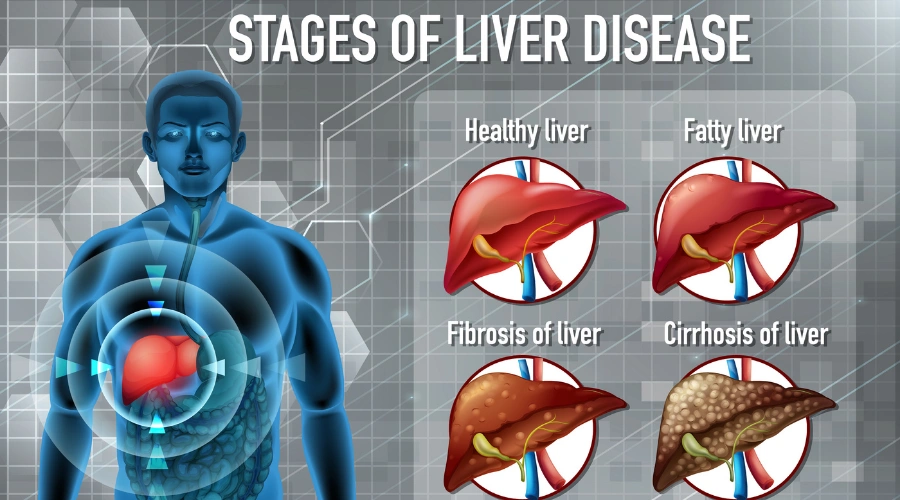Find Guidance on Liver Disease Symptoms and Options for Healing
If you suspect that you may have liver damage due to alcohol misuse, it’s time to consider enrolling in a treatment center. It’s not too late to reverse some of these symptoms and get to a healthier place.
But what are the signs your liver is healing from alcohol?
When you stop drinking, you’ll notice the liver healing within the first few weeks. Most people report more energy, less inflammation, and reduced brain fog. It also impacts your digestive system, giving you more nutrients from your diet and banishing belly fat. Alcoholic fatty liver disease isn’t permanent and can often be reversed with sobriety.
South Shores Detox is here to help you take the first steps toward your liver healing. We provide around-the-clock care needed to support your sobriety and help your liver function. Keep reading to learn more about signs that your liver damage is improving.
What are the Signs of a Liver Healing from Alcohol Abuse?
The body truly is an amazing organism that can repair itself even after extensive abuse. Alcohol misuse can lead to a decrease in liver function, but it can heal itself when you stop drinking. Many of the signs your liver is healing from alcohol are subtle and present over time.
Here is what you can expect from a healthier liver after alcohol-related liver damage.
Improved Energy Levels
Alcohol misuse can cause your liver to work overtime when processing glucose and the basic building blocks of your energy. It can no longer metabolize those elements properly or rid the body of toxins in a timely manner. The result is that you feel a sense of chronic fatigue regardless of what you eat or how much sleep you get.
When alcohol consumption stops, your liver function improves because it’s no longer working overtime to perform its basic functions. Increased energy levels are one of the first signs to surface when your liver is healing. You may see the results within the first few weeks after you stop drinking.
This opens you up to try more things that can support the liver’s ability to heal, such as exercise or even therapy, to reduce the likelihood of returning to alcohol after treatment.
Decreased Inflammation without Alcohol Consumption
Do you feel like your body becomes inflamed more easily than it did before you started to drink? The liver is responsible for releasing key enzymes whenever the body sustains some type of damage. If you’re drinking heavily, the body stops recognizing threats and begins to respond to the booze.
Liver function dramatically improves within the first week or two after you stop drinking. While you may not be able to pinpoint lower levels of inflammation, your medical care team can monitor them via blood tests. They can check for decreased liver enzymes, which let you know that you’re on the right track.
This is another great reason to have a medical care team like South Shores Detox. We can assure you that you’re on the right track to a healing process for your alcohol addiction.
Reduction in Brain Fog and Increase in Mental Clarity
Did you know that your liver health can also impact the brain? The liver is responsible for removing toxic substances from the body. When there is too much liver damage, it doesn’t function the same way, and it can lead to interference with your central nervous system.
The result is brain fog and an inability to think clearly, as well as issues with mood. If you feel down or depressed, sometimes it can be alleviated with healthier liver function, while other times it may require therapeutic intervention and medications.
You’ll notice the liver healing when you can think more clearly and focus on the tasks in front of you. It’s also possible that you notice fewer issues with your mood, which may have plagued you while drinking. Keep in mind that this isn’t an overnight change. It can take weeks or even months for brain fog to end.
Decrease in Alcoholic Fatty Liver Disease
If your doctor has diagnosed you with alcohol-related liver disease, you should take it seriously. Some of the symptoms are mild, such as digestive issues, fatigue, and a lack of appetite. However, they can increase in severity with liver inflammation and repeated damage from drinking.
The good news is that fatty liver disease is usually reversible when you stop drinking. While important to monitor the symptoms of severe liver damage, you can usually start to see healthy liver tissue within the first two weeks without alcohol.
Even alcoholic hepatitis is usually reversible if you stop drinking as soon as you notice the signs or are diagnosed by a doctor. However, once you reach ascites or alcoholic cirrhosis of the liver, there may be too much scar tissue and damage to liver cells for it to repair on its own. A liver transplant may be needed.
More Weight Loss after Alcohol-Related Liver Damage
Unfortunately, one of the signs that alcohol affects your liver is an increase in stubborn belly fat and overall weight gain. The fats you consume are stored in the liver and don’t get broken down as they should when alcohol misuse is in the picture.
While weight loss can be slow, you may notice that a healthy liver contributes to a decrease in belly fat if you also pair it with a healthy diet and exercise. If you had a hard time maintaining a healthy weight prior to your alcohol consumption, you may see great gains within the first few months of sobriety.
Of course, you can accelerate these results by working with your doctor or a nutritionist to establish healthy eating with a liver-friendly diet and exercise patterns. This is a bonus, as taking control of your health can contribute to long-term sobriety.
Reduction in Jaundice from Alcohol Misuse
One of the signs your liver isn’t doing well is an increase in jaundice. This means that your skin and even the whites of your eyes may have more yellowing than usual. This is caused by a substance known as bilirubin, which comes from the breakdown of red blood cells. Bilirubin has a yellow color that surfaces when you have severe liver disease.
Once you start to see normal liver function in recovery, the liver can process your bilirubin the way it was designed to do from the start. In liver recovery, the yellowing will eventually start to fade as the substance gets cleared from your bloodstream. Oftentimes, you’ll also experience clearer skin and a healthier complexion.
Diet and exercise can help support liver function and clear out some of these symptoms a bit more easily and faster. This is why it’s important to work with a skilled medical team for holistic care.
Better Digestion with a Healthy Liver
Liver regeneration often comes with relief for anyone experiencing digestive issues. Too much alcohol and subsequent liver problems can lead to loss of appetite, bloating, indigestion, and diarrhea. All of the important nutrients you consume are processed inefficiently and may not do the job they should.
Your gut microbiome, which impacts overall health, is disrupted and cannot maintain your health.
The good news is that the healing process will slowly restore your appetite. This is why it’s so important to enroll in a treatment center like South Shores Detox, one that provides healthy meals so that your body can replenish the nutrients that were lost due to alcohol consumption. It may take a few weeks, but you should see some of these issues slowly disappear.
How Sobriety from Alcohol Affects Your Healing Process
If you want to support liver health, one of the best things you can do is stop taking harmful substances that continue to wreak havoc on your body. When you reduce alcohol consumption, you can undo mild alcoholic hepatitis and prevent liver scarring. But it takes a multi-faceted approach to get a healthy liver.
South Shores Detox can help you through the early days without alcohol intake. Withdrawal symptoms might be intense in the first few days or weeks without booze. We can help ease some of the effects with medication-assisted treatment for nausea, insomnia, and more.
Our treatment center gives you a safe space to land where you know that you won’t pick up the bottle again while in our care. Our medical team is here for you, but so are our mental health clinicians, who can talk you through cravings and help you establish positive coping skills.
As you adjust to a life without alcohol, you’ll start to notice your liver’s remarkable ability to return to its normal function. It won’t happen overnight if you’ve engaged in prolonged alcohol use, but stay sober for a few weeks and you’ll notice some of these effects.
Get Support for a Drinking Problem at South Shores Detox Today
Are you ready to put a stop to the damage drinking can do to not only your liver function, but to the rest of your body and mind? South Shores Detox can help you take the first steps toward a sober lifestyle. At our luxurious treatment center, you’ll have access to 24/7 medical care for withdrawal symptoms.
You’re able to rest easy knowing that you won’t return to the bottle while under our care.
Our admissions team is here to answer your questions about what care might look like. We can also verify your insurance benefits in a quick and confidential phone call, allowing you to see if treatment might be covered in full. Give us a call today for same-day admissions in our program!
References
- Cunningham, C. C., & Van Horn, C. G. (2003). Energy availability and alcohol-related liver pathology. Alcohol research & health : the journal of the National Institute on Alcohol Abuse and Alcoholism, 27(4), 291–299.
- Wang, H. J., Gao, B., Zakhari, S., & Nagy, L. E. (2012). Inflammation in alcoholic liver disease. Annual review of nutrition, 32, 343–368.
- Medici, V. (2023, August 29). Alcohol-Associated Liver Disease.
- Morgan T. R. (2017). Treatment of Alcoholic Liver Disease. Gastroenterology & hepatology, 13(7), 425–427.
- Chao, A. M., Wadden, T. A., Tronieri, J. S., & Berkowitz, R. I. (2019). Alcohol Intake and Weight Loss During Intensive Lifestyle Intervention for Adults with Overweight or Obesity and Diabetes. Obesity (Silver Spring, Md.), 27(1), 30–40.
- Patel R, Mueller M. Alcohol-Associated Liver Disease. [Updated 2023 Jul 13]. In: StatPearls [Internet]. Treasure Island (FL): StatPearls Publishing; 2025 Jan-. Available from:
- Pohl, K., Moodley, P., & Dhanda, A. D. (2021). Alcohol’s Impact on the Gut and Liver. Nutrients, 13(9), 3170.




